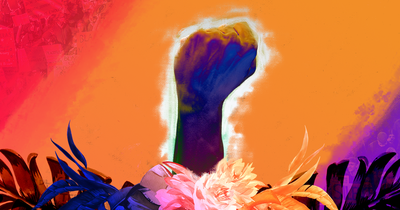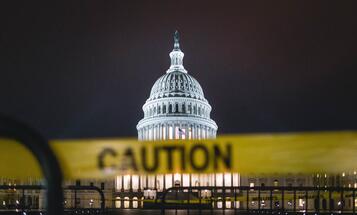
How Learning from the Haitian Revolution will Help Us Win Today
Look to Haitian history for a blueprint of how to change our current reality, dream big, and unapologetically craft a new future that is a truly inclusive democracy.

I was 9 years old when I first learned the name Amadou Diallo. Twenty years later, I now know many more—Abner Louima, Tanisha Anderson, Eric Garner, Trayvon Martin, Sean Bell, Tamir Rice, Sandra Bland, George Floyd, Breonna Taylor, Ahmaud Arbery, Tony McDade, Natasha McKenna, Aiyana Stanley-Jones, Elijah McClain, Pearlie Golden, Kayla Moore, Atatiana Jefferson. All those people and countless more have been lost to the same killer: white supremacy.
The work of dismantling institutional violence and anti-Blackness can feel like trying to break through an impenetrable wall, but with the insight of my ancestors, I have hope. This revolutionary moment calls for us all to learn from past uprisings, specifically the Haitian Revolution, to change our current reality, dream big, and unapologetically craft a new future that is a truly inclusive democracy.
The 1791–1804 Haitian Revolution is not usually framed as the world-shifting event that it was.
The 1791–1804 Haitian Revolution is not usually framed as the world-shifting event that it was. In the face of what seemed to be insurmountable challenges—total racial domination by white supremacy, constant brutalization by the authorities of a world power, and the threat of yellow fever—Haitians passionately fought against French occupation and won by using all of the approaches and resources available to them. The uprising included Black thinkers who demanded to be recognized as human beings, front-line tacticians who worked on the ground through organized protest, visionaries who imagined what a new society untethered from racial domination could look like, and the workers who did their part in any way that they could. The Haitian Revolutionaries knew they needed to employ a multitude of tactics in order to overthrow an oppressive regime.
Yet the Revolution was also imperfect. After ousting the French in 1803, tension between the mixed-race elites and the Black working class was exacerbated, and led to further inequities as a result of a caste system that was established under French-administered slavery. In early Haitian government, key official positions were given to free, wealthy, mixed-race men who were fluent in French, although the majority of the population were in closer ancestry to their African lineage and spoke mostly Kreyol. Leadership did not resemble nor reflect the population, and this created fragmented political communication between each group. A key lesson learned here was how much white supremacy saturated even what appeared as radical, political wins. White supremacy was, and is, so inescapable that it forced everyone to hold a piece of it. If we do not truly reckon with that history today, it will haunt us long after we dismantle the structures that uphold racism.
The similarities to the lessons of the Haitian Revolution are striking.
Fast forward to 2020, where COVID-19 and institutional anti-Black racism form a tidal wave that is rapidly taking Black lives and battering Black communities in the U.S. in the most heinous way. The ability to breathe, to live, appears a luxury. COVID-19 has already taken more than 143,000 lives within the last few months, with communities of color disproportionately represented in those deaths. This is due in part to the systemic inequities of access to health care, safe housing, and economic opportunity. Despite the rallying call for a dramatic rethinking for the right to live, protestors are facing an aggressive response from the U.S. government, simply as a power play. The similarities to the lessons of the Haitian Revolution are striking.
Considering the drastic odds we face today, I believe that we all must use every bit of capacity possible to take charge of this moment to repudiate systemic oppression. Using the blueprint of the Haitian Revolution, we must:
1. Uplift grassroots organizing led by those directly impacted.
At Demos, where I work, we partner with a cohort of nearly 30 organizations, mostly led by Black and Latinx grassroots leaders, through our Inclusive Democracy Project, which strives to shift structural power to Black and brown communities. Together, we are revisioning what the future can look like by addressing institutional inequality and white supremacy with radical honesty. Since 2015, we have held annual convenings in a partner state, and virtual community calls in recent months, so these powerful leaders can gather to discuss strategies and lessons learned, and advance critical work for an inclusive democracy. These groups are at the forefront of building power and creating bold policy that does not simply put a band-aid on a wound, but holistically heals injustice by creating an inclusive reality. In this way, we’re able to fundamentally shift power and assert control over our communities, while uplifting all people from oppression.
2. Interrogate how the system forces us all to hold anti-Blackness.
Each of us must put in the work to dismantle how we hold anti-Blackness. To be born and/or raised in a white supremacist society means that we each carry that unconscious bias. This weight diminishes our ability to build collective power, and endlessly reproduces itself if unaddressed. From respectability politics that police how Black and brown bodies live, to general silence in the face of brutality, we need to demolish white supremacy’s hold over us—because it keeps us from deep change and true liberation while shrouding the source of oppression. White supremacy is the smoke screen that distracts and chokes us. If we do not collectively reckon with anti-Blackness and white supremacy, it will taint any pathway toward inclusive change. As we all grow in this moment, here are some resources that resonate with me in this political context:
- “As Non-Black POC, We Need to Address Anti-Blackness," by Ana Cecilia Perez
- Social Exclusion: The Decisions and Dynamics that Drive Racism, by Connie M. Razza
- "Centering Blackness: The Path to Economic Liberation for All," by Anne Price, Jhumpa Bhattacharya, and Dorian Warren
3. Invest in Black communities and divest from exploitative forces like policing and oppressive corporations.
We must divest from structures that diminish our collective power and invest in community strength via a robust education system, a strong health care system, and a deep revisioning of policing and criminalization—areas that Black people have long called attention to. The Breathe Act and the Invest-Divest Demands by the Movement for Black Lives raise up the same priorities. This moment provides an entryway into gaining significant ground for the movement toward Black liberation from institutions that have historically abused BIPOC—with targeted intensity in Black communities. By radically divesting from white supremacist establishments and investing in communities of color, particularly Black communities, we challenge institutionally ingrained white supremacy and begin to reckon with the history and damage of chattel slavery. It is essential to invest in Black communities and rethink public safety so that the simple act of breathing is no longer a luxury but an assured outcome for all.
Despite all the names that I’ve memorized, I’m standing firm in my heritage and embracing this moment to continue pushing for systemic and holistic change toward an inclusive future. Let’s all keep going.




